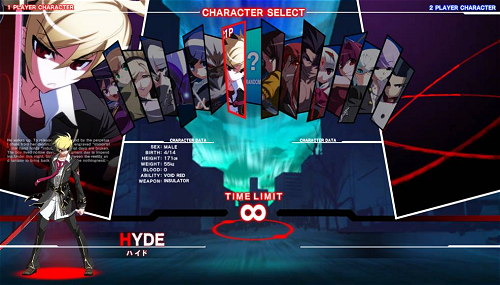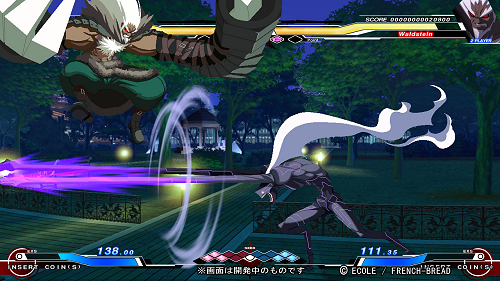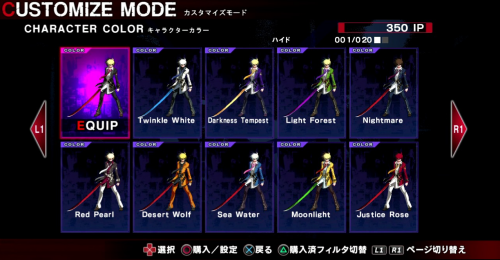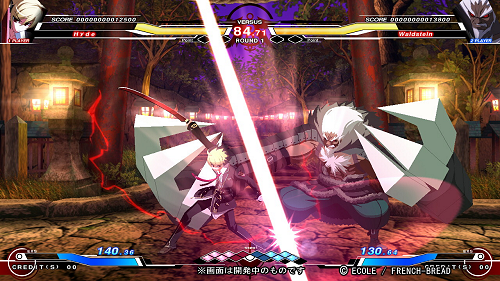Under
Night In-Birth

STORY:
A phenomenon called
the Hollow Night has been enveloping particular regions of Japan once a month
for several centuries. Each area engulfed in the Hollow Night is beset by
shadow-like creatures called Voids that utilize and feed upon a power known as
"Existence", or EXS. Normal humans cannot see or come into contact
with Voids, but certain people have the potential to perceive them. Those who
acquire this perception are targeted by Voids and risk either being consumed by
them or losing their sanity. Under special circumstances, a person who maintains
their sanity after being attacked by a Void can become a being known as an
In-Birth. While this status places a person into a sort of limbo where they are
neither living nor dead, they also gain the ability to control Existence. The
protagonist, Hyde, is one character who survived a Void attack and became an
In-Birth.
Many characters are involved
with the Hollow Night phenomenon, and several of them are affiliated with
particular organizations. Two rival groups, the Yatō and Licht Kreis, both
serve to maintain order in areas affected by the Hollow Night but differ in
their methods. The tarnished Yatō primarily hunt Voids, while Licht Kreis
uses its lawful order and hierarchy to protect civilians. A third organization,
Amnesia, is more chaotically structured and seeks to stop the influence of both
the Yatō and Licht Kreis.
|

|
|
Under
Night In-Birth character selection screen.
|
REVIEW:
When it comes to most anime fighting
games, I usually find myself loving the aesthetics but eventually losing
interest in the (arguably) overly-complex / random gameplay nuances. Judging by visuals
alone (early on),
I thought Under Night In-Birth had a
distinguishable and promising appearance, but I figured it would play
"just like any other anime fighting game". That said, I have no problem admitting that I figured
wrong this time.  Since the 2D fighting mechanics are intuitive enough to jump right in, UNIEL's
beautiful aesthetics can be enjoyed thoroughly without the player being
distracted by having to learn an entirely new kind of fighting game.
Since the 2D fighting mechanics are intuitive enough to jump right in, UNIEL's
beautiful aesthetics can be enjoyed thoroughly without the player being
distracted by having to learn an entirely new kind of fighting game.
What sets UNIEL apart from the majority of this era's anime / Doujin
fighting games, is that it has a much more "traditional" feel to it. Titles like
Guilty Gear, Blazblue, Persona 4 Arena, and Arcana Heart
are known for their "ultra
floaty" jumping & air-dashing, and ridiculous number of projectiles
flying around.
UNIEL dials things back a few notches, giving characters a simplified air dash technique which
has them immediately moving downwards after air-dashing (ohh hello gravity, nice
to see you there).  Another standout element of UNIEL is the awesome reach & range of
some special moves,
super moves, and certain normal attacks. If you don't play carefully and
smartly, your character
could get slashed from all the way across the screen in the blink of an eye.
This definitely gives the game a unique pace.
Another standout element of UNIEL is the awesome reach & range of
some special moves,
super moves, and certain normal attacks. If you don't play carefully and
smartly, your character
could get slashed from all the way across the screen in the blink of an eye.
This definitely gives the game a unique pace.
Practically all inputs are "simple"... with your basic Hadouken, Shoryuken, and charge
motions. Some projectiles are even performed simply by holding a direction and
hitting one button. The simplicity conveniently speeds up the process of
learning a new character... a respectable asset in any new series. UNIEL also borrows the auto-combo
concept from P4A: Arena, enabling players to perform a basic combo (into super)
with any character, simple by tapping one
button. Believe it or not, the auto-combo system can actually help you learn
REAL combos over time.  That said, UNIEL is a surprisingly easy game to get into (but challenging to
master, of course). An anime fighting game
that's inviting both visually and gameplay-wise? Sign me up.
That said, UNIEL is a surprisingly easy game to get into (but challenging to
master, of course). An anime fighting game
that's inviting both visually and gameplay-wise? Sign me up.
|

|
|
Crispy 2D sprites and
fresh character designs... what's a Blazblue again?
|
In my opinion, a fighting game with
"been there, done that" character designs will never really catch on regardless of how good the gameplay is. Thankfully, the cool & unique character designs of UNIEL
succeed at being intriguing and making a statement (check TFG's Character
Reviews for my full impressions). Basically, I don't feel like I have to embark
on a journey into anime pop culture, and have to Google weird anime references, in order to
understand UNIEL's designs. The characters are just cool, and fun to
use... simple as that.
I found myself not only appreciating the aesthetic
artistry of many of the designs, but delightfully surprised at how badass they
are to play. In addition to the simple inputs, the intuitive combo engine of UNIEL makes learning combos
and strategies for each
character very natural. UNIEL's combo system has
your basic Darkstalkers-esk chain-combos, into
specials, into supers... plus some ultra cool air-combo possibilities which
aren't difficult to learn at all. UNIEL's
meter system (the "Grind Grid") is a little unusual, yet innovative, as it enables
one fighter per round to enter what's called the "Vorpal" state
(raising damage output by 10% and making it possible to use Chain Shift - AKA canceling). P.S. You don't have
to understand any of that to enjoy the game. 
Even if you're not necessarily in love with any of the character
designs... try them. Try each and every one of them. You'll most likely be surprised with how many cool
attacks and options they have, like I was. I like my 2D fighting game characters
to have options, and there's plenty of variety in UNIEL. Possibly my
favorite aspect is how many different super moves each character has, along with
a (usually) pretty badass "mega" screen-filling super move. 
Another subtle but very cool thing UNIEL's characters have going for them is the plethora
of color palette options!
Customize
mode lets you set your own "default" color for each character on
the selection screen and online mode, so your favorite color shows up first. It's no
color edit, but the 10 extra selectable colors per character (on top of the original 10)
are much appreciated and nicely designed. It'll also take you a while to
unlock all of the colors, along with all the character art & endings in the
Gallery.
|

|
|
UNIEL's
color scheme "names" are too f*ing cool and stylish.
|
The PS3 version of UNIEL
features 8 gameplay modes, including:
Story, Score Attack, Time Attack, Survival, Training, VS CPU, and Network.
Network mode features 8-player lobbies with spectating functionality,
Ranked Battles and online leaderboards. Like other fighting games, players can
trounce around in Training while waiting for an online opponent. Overall, the
netcode seems "fair"... as I've had several smooth matches but
also some laggy ones (definitely playable at the least). Network also lets you save & watch replays, but
unfortunately, no frame-by-frame playback like in
P4A:
Ultimax.
Visually, UNIEL's large and well-animated character sprites are as good as you'd
expect from a 2D fighter published by Arc System Works. Not only do attacks look
fluid and awesome, but damage animations pack more "ouch factor" than most anime fighting games!
 Something about the sound
effects, and the way characters hit the ground (they don't always just fall flat on
their back), look and feel very satisfying. You simply can't judge this game by
screenshots alone... Under Night In-Birth is beautiful in motion! Something about the sound
effects, and the way characters hit the ground (they don't always just fall flat on
their back), look and feel very satisfying. You simply can't judge this game by
screenshots alone... Under Night In-Birth is beautiful in motion!
UNIEL's stages are generally kinda sleepy, and remind me of good
ol' fashioned "3D-style, PS2 2D fighter" backgrounds.  Perhaps
some more 2D sprite elements in the backgrounds would've spiced things up a bit. In a
nutshell, the stages are lonely and barren... there are no cameo characters or
signs of life whatsoever (not
even as much a cat running across the screen). The environments are borderline depressing, but nonetheless, seem to set a cool "vibe" for the game. The music of UNIEL is a weirdly interesting mix.
The soundtrack is tolerable at the very least, and thankfully
doesn't push the "tinny / upbeat" sound like some other anime
fighters do. There are even some "metal-esk" tracks with powerful guitar riffs... and overall, I
actually enjoy the soundtrack. (Also,
shoutouts to that one stage BGM that sounds exactly like a SF4 tune)!
Perhaps
some more 2D sprite elements in the backgrounds would've spiced things up a bit. In a
nutshell, the stages are lonely and barren... there are no cameo characters or
signs of life whatsoever (not
even as much a cat running across the screen). The environments are borderline depressing, but nonetheless, seem to set a cool "vibe" for the game. The music of UNIEL is a weirdly interesting mix.
The soundtrack is tolerable at the very least, and thankfully
doesn't push the "tinny / upbeat" sound like some other anime
fighters do. There are even some "metal-esk" tracks with powerful guitar riffs... and overall, I
actually enjoy the soundtrack. (Also,
shoutouts to that one stage BGM that sounds exactly like a SF4 tune)! 
|

|
|
Waldstein is
definitely Hsien-Ko's grandfather.
|
As to be expected from an
arcade anime fighting game, the presentation is decent... but isn't too
elaborate. The intro theme is pretty catchy and well done, at least. For character
endings, all you get is dialogue and a single ending artwork.  Story mode will set up each
character's basic premise, consisting mainly of spoken dialogue with text, and
the usual character portraits with various facial expressions. Overall, some of
the storylines are halfway entertaining and flesh out the personalities, while
others are typical anime fare.
Story mode will set up each
character's basic premise, consisting mainly of spoken dialogue with text, and
the usual character portraits with various facial expressions. Overall, some of
the storylines are halfway entertaining and flesh out the personalities, while
others are typical anime fare.
Other elements of the game help it stand out from other fighters... instead of
the classic "Round 1 - Fight!"... rounds in UNIEL begin with
"First Clause - Divide!"  I dunno, to me it just seems like they were trying too hard to be different. No
free hit after K.O. also disappoints me... and ruins
my fun sometimes.
I dunno, to me it just seems like they were trying too hard to be different. No
free hit after K.O. also disappoints me... and ruins
my fun sometimes. 
|
|

| Page Updated: |
September
20th, 2023 |
| Developer(s): |
French
Bread, Ecole Software |
| Publisher(s): |
Sega  ,
Arc System Works ,
Arc System Works  |
| Platform(s): |
Arcade, PlayStation 4, PS3, PS Vita
|
| Designer(s): |
Nobuya
Narita
Director, Producer
Toshimichi Mori Producer
Serizawa Kamone Battle Planner
|
| Release Date(s): |
Sept.
20th, 2012
 Arcade - Under Night In-Birth Arcade - Under Night In-Birth
Sept. 9th,
2013  Arcade - Exe: Late update Arcade - Exe: Late update
July 24th, 2014
 PS3 PS3
Feb. 24th, 2015  PS3 PS3
Feb. 27th, 2015  PS3 PS3
May 15th, 2015  Arcade - Late[st] update Arcade - Late[st] update
July 12th, 2016
Steam
July 20th, 2017
 PS4/PS3/Vita - Late[st]
update PS4/PS3/Vita - Late[st]
update
Feb. 9th, 2018  / /
 PS4/PS3/Vita - Late[st]
update
PS4/PS3/Vita - Late[st]
update |
| Characters: |
Hyde,
Linne, Waldstein, Carmine,
Orie, Gordeau,
Merkava, Vatista,
Seth, Yuzuriha,
Hilda, Chaos,
Akatsuki, Eltnum,
Nanase, Byakuya |
|
|
|
Featured Video:
|
|
|
| Related Games: |
Under
Night In-Birth EXE: Late[st],
Under Night In-Birth EXE:
Late[cl-r], Under
Night In-Birth II [Sys:Celes], Dengeki
Bunko Fighting Climax, BlazBlue: Continuum Shift
Extend, BlazBlue: Chrono Phantasma,
BlazBlue: Central Fiction, Skullgirls,
The King of Fighters XIII, Arcana Heart 3,
Aquapazza, Guilty
Gear XX: Accent Core Plus, Guilty Gear Xrd -SIGN-, Legend of Raven, Xuan
Dou Zhi Wang, Chaos Code, BlazBlue
Cross Tag Battle, Akatsuki Blitzkampf |
|

|
|
Gameplay
Engine
|
8.5 / 10
|
|
Story
/ Theme
|
6.0 / 10
|
|
Overall
Graphics
|
8.0 / 10
|
|
Animation
|
9.0 / 10
|
|
Music
/ Sound Effects
|
8.0 / 10
|
|
Innovation
|
8.0 / 10
|
|
Art Direction
|
8.0 / 10
|
|
Customization
|
8.5 / 10
|
|
Options / Extras
|
8.0 / 10
|
|
Intro / Presentation
|
7.5 / 10
|
|
Replayability / Fun
|
8.5 / 10
|
|
"Ouch" Factor
|
8.5 / 10
|
|
Characters
|
9.0 / 10
|
|
BOTTOM LINE
|
8.6
/
10
|
|
Review based on PS3 version
|
|
| Final
Words: |
UNIEL offers an unique experience that shouldn't be missed by any 2D fighting
game fan... I actually don't say that about many anime fighting games, so do take
note. Under Night
In-Birth EXE Late is a surprisingly polished 2D fighter, and to me, much
more intriguing than
French Bread's earlier offering, Melty
Blood... both visually and from a gameplay standpoint. As a whole, UNIEL's
character designs aren't the typical anime fare... and
after trying out all of UNIEL's characters, I was even impressed by the
majority of them.
I really love the "limited" air-dash, which is good if you're not a
fan of those 90' horizontal air dashes in other anime fighters. The air-dash is
similar to the
trajectory of an air hurricane kick, and every character can do it and add an attack
to the jump as well. It works really well with the gameplay, and makes the game
far less floaty than other anime fighters. While I appreciate UNIEL's accessibility, I
actually don't like the ultra-easy "half
circle" supers... mainly because it makes it very easy to launch a super
move by
accident. *sigh* Fine, I'll play cleaner. 
UNIEL's art style is a bit "loud" for my tastes, but may appeal to some. To
be specific, something about the way character faces are drawn irks me a bit...
as most characters seem to have giant "bug eyes" (which creep me out). It's just a gripe, because otherwise, the artwork is actually pretty
excellent (and most important, the sprites are awesome).
Once again, UNIEL sports a very good cast of characters... one of the
most well-rounded rosters I've seen in a while. The characters are equally fun to use and well-balanced in terms of how they
play... (but I'm not 100% sure about their competitive standing at this point).
UNIEL has more in common with Darkstalkers than it does with some
other anime fighters of this era. Thanks to the character diversity, many character match-ups
end up being interesting... and can result in some pretty crazy projectile wars
(or other fun mind games).
In all honesty, I
wouldn't be caught dead playing "certain" anime fighting games
that are out there... but I'd throw down in some UNIEL any time. ANY
TIME. It's a fun game. A
lot of my favorite 2D fighting game strategies, mix-ups, and combo setups are found in
UNIEL in some form or another. There's not much of
a learning curve (besides learning the characters themselves), which is a great
asset for
an anime fighting game these days. I guess you could say... UNIEL is anime fighting done
right!  If you
usually don't like "anime" fighters, you might actually
like UNIEL. If you
usually don't like "anime" fighters, you might actually
like UNIEL.
~TFG
Webmaster |
@Fighters_Gen
|
|
|
|
|
|
|
|
UNIEL
FUN FACTS
Under Night
In-Birth was made
by
the creators of the Melty Blood series (which never saw a
console release outside of Japan).
The HD 2D fighter runs in 1280 X 720 resolution with a 16:9 aspect
ratio. Development started in 2010, and the
original version was
released in Japanese arcades in September 2012.
The first update to the
game, titled Under Night In-Birth Exe:Late (commonly dubbed UNIEL),
was released a year later in September 2013. UNIEL added Chaos to the roster, as well as a guest character,
Akatsuki, from another obscure doujin fighting game, Akatsuki Blitzkampf. The
second update, titled Under Night In-Birth
Exe:Late[st], released in Japan arcades in late
2015. The [st] update adds Phonon as a new character. Further updates to [st]
would add Mika, Enkidu, Wagner, and gameplay balance updates.
|
|
|
|
|
|
|
|